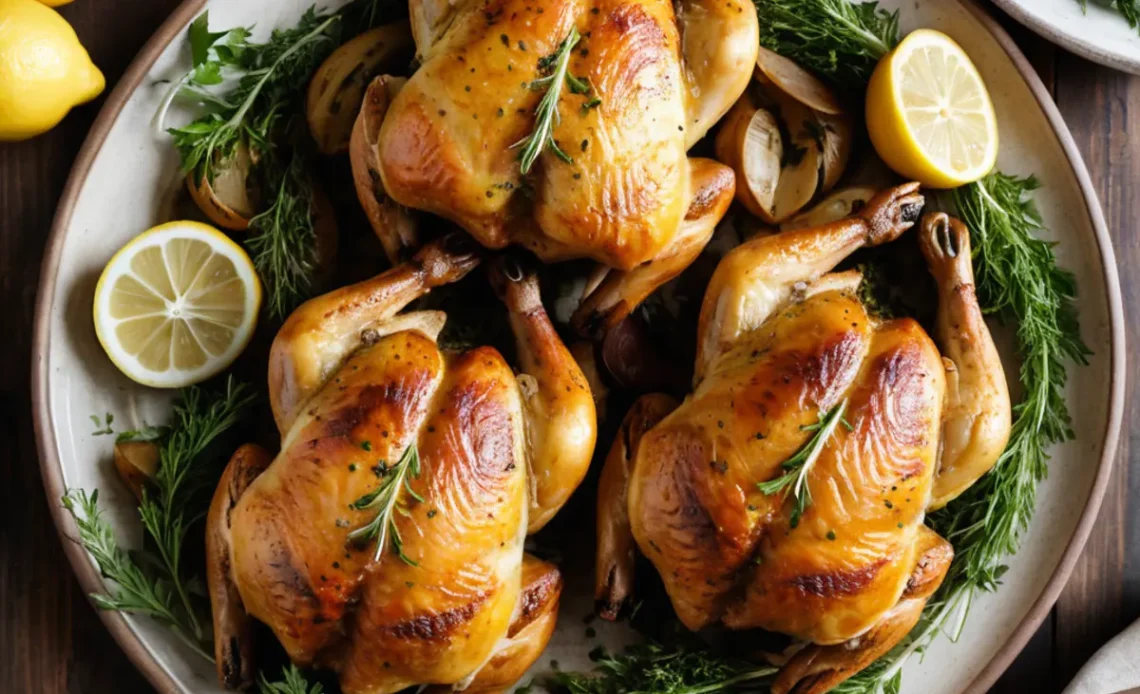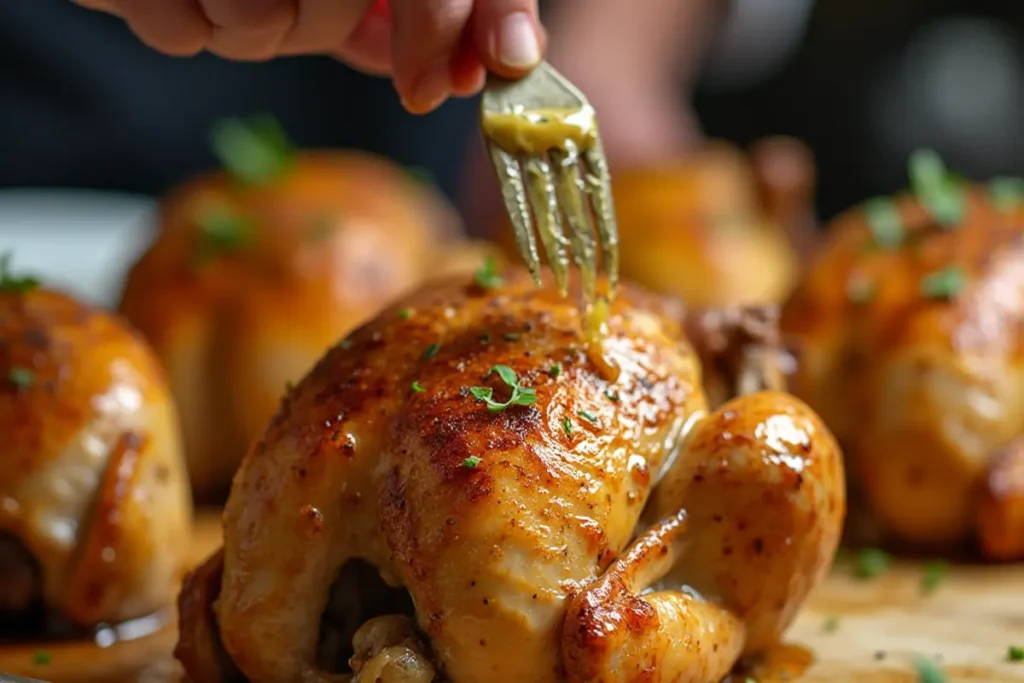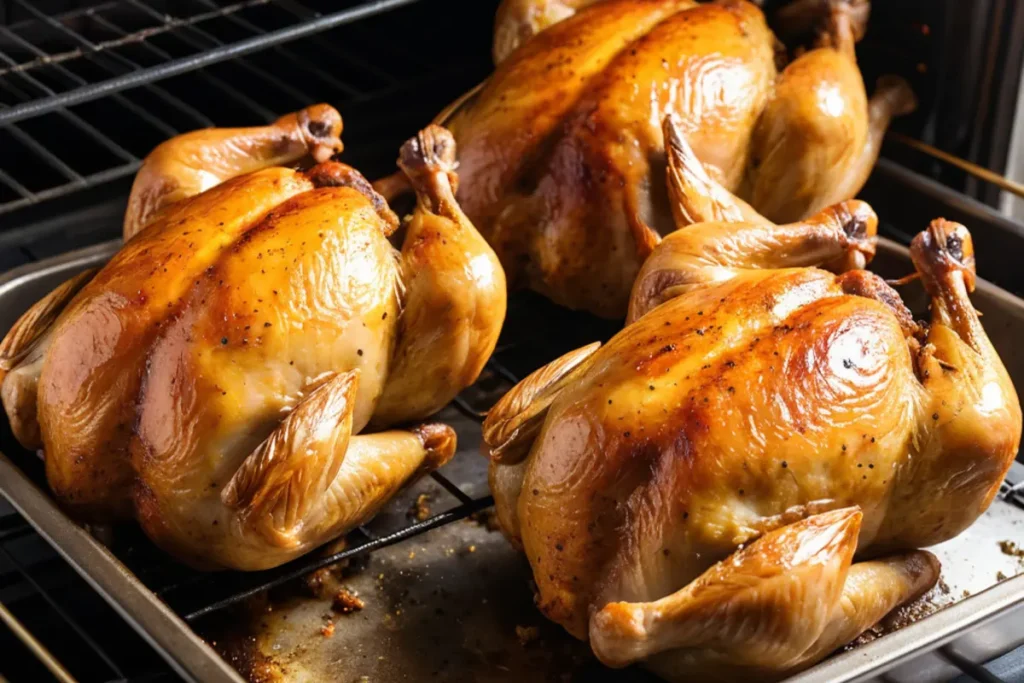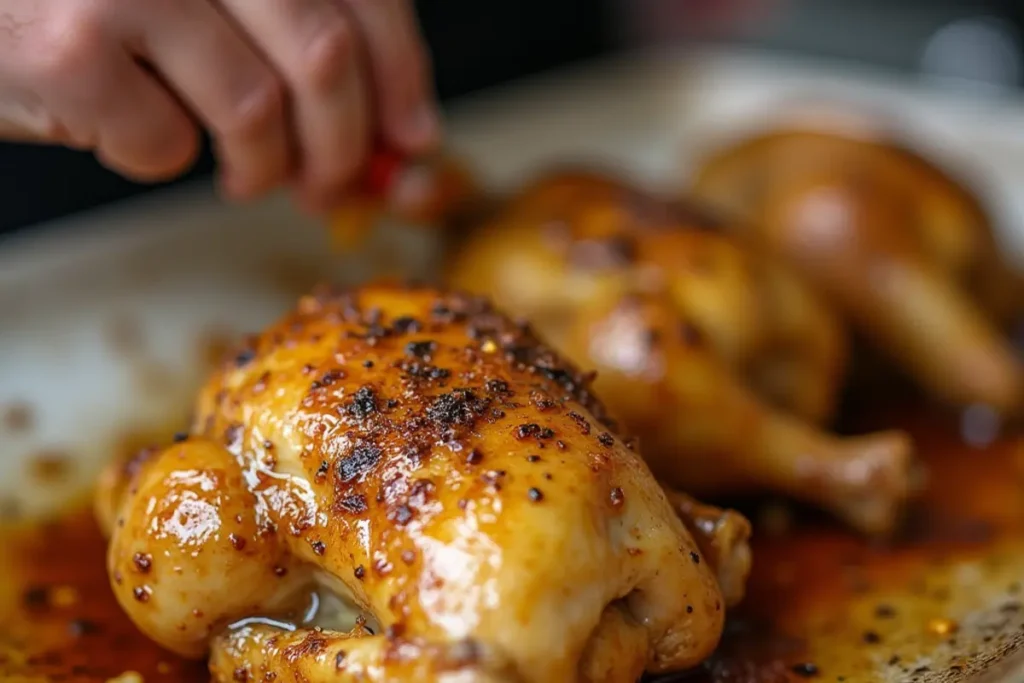
ANNONCE
Table of Contents
Introduction: Why Cornish Hens are the Perfect Dinner Choice
When you’re craving something different from the traditional roast chicken, Cornish hens offer an elegant, individual twist. Their tender meat and crispy skin are perfect for a cozy, intimate dinner or as the star of a festive feast. These little birds are not just a miniature version of a chicken; they bring a delightful balance of flavors and textures that elevate any meal. Whether it’s a quiet dinner for two or a gathering of friends and family, roasted Cornish hens make every occasion feel special.
Their small size makes them ideal for individual servings, ensuring everyone gets their own personal bird. Each bite bursts with juicy tenderness, thanks to the infusion of spices and citrus in the marinade, while the skin crisps up beautifully, adding a satisfying crunch. From romantic nights in to holiday dinners, Cornish hens bring sophistication and simplicity together in one flavorful package.
What are Cornish Hens?
Cornish hens, often mistakenly thought of as a distinct breed of poultry, are actually just small, tender chickens. They are typically about 1 to 1.5 pounds each, making them perfect for single-serving roasts. Originally, the name “Cornish hen” referred to a specific breed of chicken developed in Cornwall, England, but today, it’s used more generally to describe any small chicken that’s harvested while young.
Though their flavor is similar to that of a regular chicken, Cornish hens stand out due to their size and texture. The meat is more delicate, with a slightly milder flavor, and they have a higher proportion of tender dark meat, especially around the thighs. Because of their small surface area, they absorb marinades and seasonings beautifully, resulting in a rich, flavorful roast. Their petite nature also makes them ideal for smaller gatherings, where each guest can enjoy their own personal serving of roasted perfection.
ANNONCE
ANNONCE

The Ingredients for Roasted Cornish Hens
For the Spiced Garlic Marinade
The magic of this recipe lies in the marinade, which infuses the Cornish hens with a bold blend of garlic and spices. The marinade is aromatic and full-bodied, featuring a mixture of warming allspice, earthy thyme, and a hint of nutmeg. These spices harmonize beautifully with the sharp, fresh citrus of lemon or lime, which helps tenderize the meat while adding brightness. Garlic, of course, is the star of the show, infusing the hens with an unmistakable depth of flavor.
Extra virgin olive oil binds all these ingredients together, ensuring the spices coat the hens evenly. Olive oil not only brings flavor but also helps the spices stick to the meat, promoting a crispier skin as the hens roast. The olive oil, combined with the citrus and thyme, creates a marinade that is complex yet easy to prepare.
For the Hens
When selecting Cornish hens, aim for birds that are similar in size to ensure even cooking. Typically sold frozen in packs of one or two, you’ll want to choose fresh or thawed hens that weigh about 1 to 1.5 pounds each. This size allows them to cook through without drying out while still developing a rich flavor profile.
ANNONCE
In addition to the hens, you’ll need a few key ingredients to elevate the dish: celery, onion, and chicken broth. Celery and onion are used to stuff the hens, which not only imparts additional flavor but also helps keep the birds moist during roasting. Chicken broth is essential for basting the hens as they cook, ensuring they remain juicy while they brown to a perfect crisp.
Preparing the Perfect Spiced Garlic Marinade
Creating the spiced garlic marinade is quick and simple, yet the result is a complex flavor that will leave your guests guessing. Start by peeling 15 to 20 garlic cloves, which will create the rich, aromatic base of the marinade. Add the garlic to a food processor along with the paprika, allspice, thyme, nutmeg, black pepper, and salt. The paprika brings a slight smokiness to the dish, while the allspice provides a deep, warm note. Nutmeg adds an unexpected depth that complements the earthiness of the garlic.
Once the dry ingredients are combined, add the fresh lemon or lime juice to bring brightness to the mixture. Pulse everything until it forms a pulpy, thick marinade that will coat the hens beautifully. The olive oil ensures the spices adhere well to the meat, while also contributing a smooth richness that enhances the overall flavor.

Prepping and Cooking Cornish Hens
Marinating the Hens
To ensure the Cornish hens are packed with flavor, apply the marinade generously. Start by lifting the skin of each hen and working some of the marinade underneath. This allows the spices to permeate the meat directly, ensuring every bite is full of flavor. Don’t forget to stuff the cavity with a mixture of onion and celery, which will infuse additional flavor as the birds cook. Let the hens marinate for at least an hour, though overnight is even better for maximum flavor.
ANNONCE
Searing for Texture
Before roasting, sear the hens in a lightly oiled cast-iron skillet or grill pan. This step helps develop a golden-brown crust, which is key for both flavor and presentation. Searing also enhances the texture, ensuring that the skin crisps up beautifully while keeping the meat tender. Be sure to sear all sides of the hens to create an even, appetizing color.
Roasting Process
Once the hens are seared and stuffed, it’s time to roast. Place the hens in a roasting pan and add chicken broth to the bottom of the pan. This will create a moist roasting environment, helping the hens stay juicy while they cook. Baste the hens with the broth every 15 minutes to keep them from drying out and to encourage even browning. Roast at 425°F for about an hour to an hour and 15 minutes, or until the hens reach an internal temperature of 165°F. Allow the hens to rest for 10-15 minutes before serving, letting the juices settle for maximum flavor and tenderness.
Creative Variations and Serving Suggestions
While this roasted Cornish hen recipe is delicious as is, there are plenty of ways to get creative. Try roasting the hens on a bed of vegetables such as carrots, Brussels sprouts, or baby potatoes. The vegetables will cook in the flavorful drippings from the hens, adding even more depth to the meal.
For a larger crowd or if you prefer using a whole chicken, this recipe can be effortlessly adjusted for a 3-5 pound bird.. The roasting time will need to be adjusted, so use a meat thermometer to ensure it’s cooked through. For a fun outdoor twist, consider grilling the Cornish hens instead of roasting them in the oven. Simply sear the hens over direct heat for a few minutes to get grill marks, then move them to indirect heat to finish cooking.
ANNONCE
Tips for Cooking and Presentation
Achieving the perfect roasted Cornish hens requires a few key techniques. For crispy skin, don’t skip the searing step. The Maillard reaction (the chemical process that gives food its golden-brown crust) is essential for flavor and texture. Use a thermometer to check the internal temperature; Cornish hens are done when they reach 165°F in the thickest part of the thigh.
Resting the hens after roasting is just as important as the cooking process itself. Let the birds sit for at least 10 minutes before carving, allowing the juices to redistribute. This step guarantees every bite will be juicy and full of flavor.

Make-Ahead and Storage Advice
To save time on the day of your meal, consider marinating the hens a day in advance. Simply apply the marinade, cover, and refrigerate overnight. You can also chop the vegetables ahead of time to streamline the cooking process. Store leftover roasted Cornish hens in an airtight container in the fridge for up to 3 days, or freeze them for up to 2 months.
Side Dishes to Complement Roasted Cornish Hens
Roasted Cornish hens pair beautifully with a variety of side dishes that can also be cooked in the oven. Try pairing them with roasted vegetables like Brussels sprouts, sweet potatoes, or a medley of root vegetables for a comforting, hearty meal. For a more refined side, serve them with a rich mushroom risotto or a light rice pilaf to soak up all the flavorful drippings.
ANNONCE
A fresh salad is also a great complement. A roasted beet salad with crispy kale and almonds adds a burst of color and earthy flavor, while a Mediterranean-style potato salad brings a tangy, refreshing contrast to the richness of the hens.
Ingredient Spotlight: The Magic of Allspice
Allspice is an unsung hero in many kitchens, yet it’s a spice that can elevate both sweet and savory dishes. Native to the Caribbean and Central America, allspice has a unique flavor that combines the warmth of cinnamon, cloves, and nutmeg. It brings complexity to marinades and sauces, enhancing the natural flavors of meats like Cornish hens.
In this recipe, allspice works in harmony with garlic, paprika, and nutmeg to create a well-rounded, aromatic marinade. If you don’t have allspice, ground cinnamon or cardamom can be used as substitutes, though they won’t provide the same depth of flavor.
FAQs: Golden-roasted Cornish hens infused with cozy spices and a hint of garlic warmth.
1. Can I use regular chicken instead of Cornish hens?
While Cornish hens have a unique size and flavor, you can substitute a whole chicken if needed. A whole chicken will require longer roasting times—typically 1.5 to 2 hours at 425°F. Keep in mind that the texture and flavor might differ, as Cornish hens are more tender and have a higher proportion of dark meat.
ANNONCE
2. How do I know when Cornish hens are fully cooked?
To ensure doneness, use a meat thermometer. Insert it into the thickest part of the thigh, avoiding the bone. The hens are ready when the internal temperature hits 165°F. The juices should run clear, not pink.
3. Can I prepare the marinade in advance?
Yes! You can prepare the marinade up to 48 hours in advance.Just place it in an airtight container and store it in the refrigerator. This gives the spices even more time to meld together, resulting in a richer, more flavorful marinade.
4. How do I achieve crispy skin on my Cornish hens?
To get perfectly crispy skin, sear the hens in a hot pan with a bit of olive oil before roasting. This step helps to render the fat and crisp up the skin. Additionally, roasting the hens at a high temperature (425°F) will encourage the skin to brown and become crispy. Avoid overcrowding the roasting pan to ensure proper airflow and even cooking.
5. Is it possible to prepare this dish in advance?
While Cornish hens are best served fresh, you can make them ahead by roasting and then reheating them. To do this, roast the hens as directed, let them cool, then store them in the refrigerator for up to 3 days. To reheat, place them in a 350°F oven until warmed through (about 15-20 minutes). For best results, add a little chicken broth or water to keep them moist while reheating.
ANNONCE
6. Can I grill Cornish hens instead of roasting them?
Yes! Grilling Cornish hens adds a smoky flavor and crisp texture. To grill, sear the hens over direct heat for about 4-5 minutes per side to get grill marks, then move them to indirect heat and cook for another 30-40 minutes, depending on their size. Be sure to baste periodically and check the internal temperature to ensure they’re fully cooked.
Conclusion: Elevate Your Cooking with Cornish Hens
Roasted Cornish hens with warming spices and garlic is a dish that’s as simple as it is elegant. The combination of crispy skin, tender meat, and aromatic spices creates a meal that’s sure to impress. Whether you’re celebrating a special occasion or simply seeking a comforting dinner, Cornish hens bring sophistication to any table.
Experiment with different flavor combinations, try new techniques, and let this dish become a staple in your roasting repertoire. Each meal can become a memorable event when you embrace the versatility and elegance of roasted Cornish hens.

